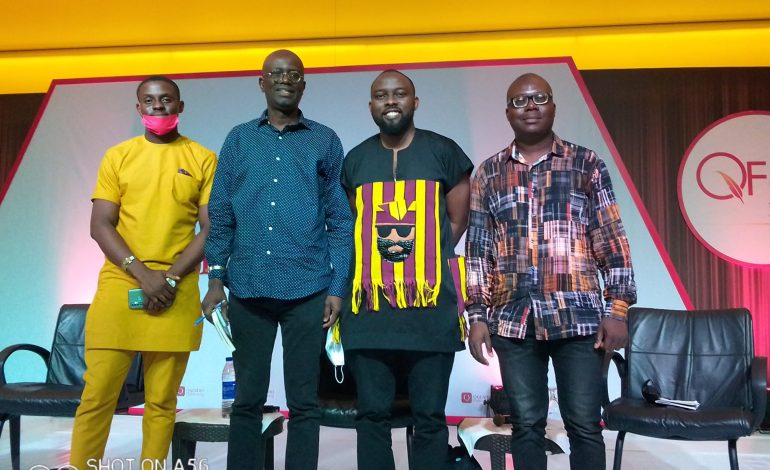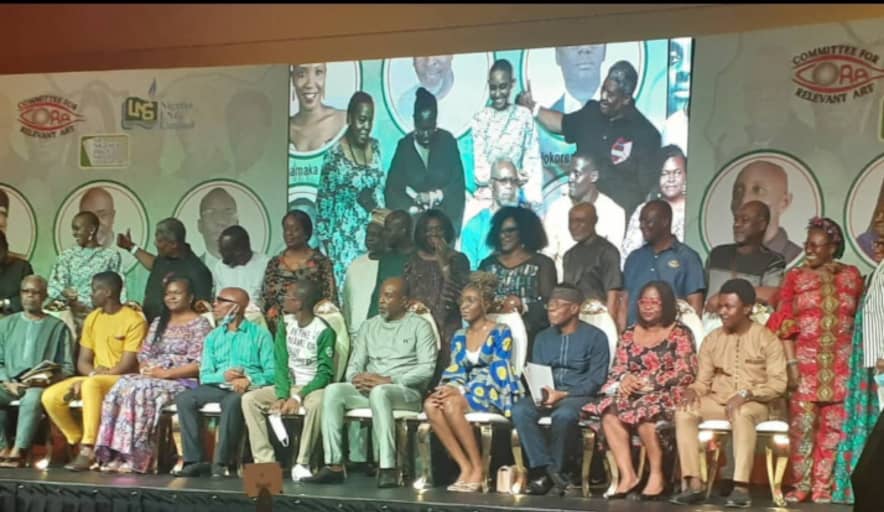‘The Broken Wings’ fetches Olowookere JEHF Playwright prize 2021

‘James Ene Henshaw not given a fair place in the pantheon of African playwrights’
By Godwin Okondo
THE James Ene Henshaw Foundation (JEHF) recently held a virtual award ceremony to announce the winner of this year’s playwriting competition worth N100,000 prize money. Dignitaries that graced the ceremony included literary artists, ambassadors, ministers, commissioners, such as Cross River State Commissioner for Culture and Tourism, Mr. Eric Anderson, former Nigerian Ambassador to Ethiopia, and founder of Gender And Development Action (GADA), Amb. (Mrs.) Nkoyo Toyo, the 3-man jury – professor of drama at the Department of English, University of Lagos, Lagos, Hope Egagha, Treasurer of the African Theatre Association (ATA), Dr. Oladipo Apoluaje, and writer and journalist, Mr. Anote Ajeluorou. The three shortlisted young playwrights were also in attendance.
The three shortlisted playwrights for the award were Bukola Olowookere’s ‘The Broken Wing,’ Mayowa Oladeji’s ‘The Little Gods of Walls,’ and Hillary Nwafor’s ‘We Men.’

Mr. Anderson, who delivered the opening address of the programme, said, “It’s an honor to be here. I’d like to also appreciate the foundation for putting this up. By these playwright awards, I believe that the foundation has a further cause of rewarding and energizing playwrights, which, of course, is a way to keep sustaining the African art heritage. So, for those that have been chosen, I’d like to say congratulations in advance, especially to the person that will take the day.
“From us here, the Government of Cross River State, the Ministry of Culture and Tourism, we hope that we find ways to collaborate in further events of the foundation. Thank you very much for having me and I wish you a successful deliberation today.”
The head of jury, Oladipo, reviewed the three plays to give perspectives to the global audience.
“On behalf of my fellow judges,” he started with preliminary remarks, “I’d like to congratulate the foundation for organizing this competition to promote play writing in Nigeria. The country has gained a global reputation in film, music and fiction, with theatre lagging behind. So, any action to reclaim Nigeria’s the literary dramatic tradition of writers like Wole Soyinka, Femi Osofisan, Ola Rotimi, Tess Onwueme, and, of course, James Ene Henshaw, must be lauded.
“I also want to congratulate the playwrights who submitted to the competition and the shortlisted playwrights. Starting with a blank page, then you have to think of a character, plot, story and theme, and the right narrative to get a play going. To have come this far is an achievement itself.”
Then Oladipo delved into the review proper when he said, “’We Men’ by Hillary Nwafor is a story of a group of friends who meet up to discuss their domestic tribulations. Their individual problems stretch the group to breaking point. Their characters are clearly narrated, and as we move from scene to scene, we get to see their frustrations, hopes and their fragility. In short, we get a sense of sympathizes for the men and the crisis of masculinity that arise from the pressures and expectations of society.
“’The God of Walls’ by Mayowa Oladeji is set inside a prison. It’s about the relationship among inmates and their keepers and the wider commentary about social conditions facing Nigerians. In this play, the prison acts as a microcosm of the country. The prisoners are from different backgrounds and the social problems facing the country at large play out within the prison walls. Each prisoner is in custody for different reasons and all of them are abused by the rapacious warder. In the last half, there is an attempt to uncover a traitor in the ranks. The free element also serves to offer a glimmer of hope that justice can still be served.
“’Broken Wings’ by Bukola Olowookere is set in northern Nigeria; it’s the story of young Halima. She’s been married off by her parents at a young age with a promise by her husband, Garba, that he will allow her complete her education before he continues the marriage. Garba reneges on his promise and Halima’s pregnancy causes her health problems. The play takes in several themes: the role of womanhood, health provisions for women, traditional versus modern ways of giving birth and how superstition can leave many shunned by their community through no fault of their own. It’s a strong directive between the different positions the characters take, which propels the debate and the story forward. The dialogue is rigorous and at the same time filled with emotions. There is a buildup in the story as we see the rallying of anti-progressive forces against Halima in her quest for justice.”
Daughter of the late James Ene Henshaw, Mrs. Caroline Etuk, was called to announce the winner of the competition. She spoke about “the passion that has driven the foundation from its inception in 2013 till this day in a manner of speaking. I’ve seen that passion wax and wean under various trying situations and I wish you all the best. I wish you greater heights and more accomplishments in the future.

“I also would like to congratulate not just the shortlisted playwrights, but everyone who participated in this. Writing is a lot of hard work, and I must congratulate you young people for putting your hands to the plow and I would say just keep at it.”
“‘We Men’ by Hillary Nwafor is second runner-up while ‘The God of Walls’ by Mayowa Oladeji is first runner-up. The winning play is ‘The Broken Wings’ by Bukola Olowookere.
“Those are the three young people that have done us proud, and particularly for the winner of this competition, Bukola Olowookere, who has won the playwright contest with ‘The Broken Wings’. Thank you very much and congratulations!”
The winner of the competition Olowookere was also present and expressed her gratitude audience, when she enthused, “It’s been wonderful. From the beginning to the mentor I got, it’s been wonderful. Thank you all so much.”
Son of the late James Ene Henshaw and Secretary of the foundation, Mr. James Ene Henshaw Jr, thanked everyone for the support received for the initiative.
He said, “Thank you very much everyone for being present. Your support is really, really appreciated. It’s at times like this we know that in this endeavor, we are not alone, because all the time we were working and trying to put things together and it appears as if it isn’t actually working, but I’m very happy today.”
While addressing the contestants, he said, “I will say congratulations to the winner and the shortlisted contestants. You writers have come on a journey, and today is their day, and we acknowledge their hard work.
“The writing competition is the essence of the James Ene Henshaw Foundation, but it is just not the prize. This competition is actually a mentoring programme that involves support for the writers and other development activities that enable the writers to improve and work on their craft. We need plays that can withstand the test of time, so what the foundation is trying to do is to develop a stream of playwrights in Nigeria. ”
Ambassador Nkoyo also congratulated the contestants on their performance, saying, “Congratulations to the foundation and the winners. The James Ene Henshaw Foundation is one that is African-centred in terms of the rights, the playwrights and the kind of story that is being told. I would like to say that in terms of contemporary society, I’m looking at what’s going on in Africa. Africa is a continent of a lot of young people. So I think the decision to do this around young people and young playwrights is important and extremely useful.
“There are many stories to be told, and these stories told by these young writers reflect how much we capture the essence of our society, but what needs to happen beyond all of this is how we make a connection between these stories and defining what our society should be and what it should be for the young people who write these stories. Thank you so much for listening. I look forward to yet another year of very exciting, and interesting encounter with the writers from our country.”
A member of the family, Senator Bassey Henshaw, said, “James Ene Henshaw was my uncle, and I know how much his son James has struggled from the very beginning to put this together, and I think that he has now found a goal for moving this idea forward. So, I want to congratulate him for a good job well done and to offer whatever support to make sure that this goes on to become a yearly affair in whatever form.
“Hopefully, stories like these can get to the right waters, and encourage education and change society for the better. I want to thank you very much, the judges. I congratulate the winners, and hope that this will spur you up to write better things in the future.”
In his brief lecture to the finalists, Prof. Hope Eghagha said, “The competition, for me, is a reawakening of the spirit of James Ene Henshaw. I encountered him as a secondary school boy and that iconic play, This Is Our Chance, made an impact on us, and I can still remember some of the lines. That shows you how much impact that playwright made on us.
“When his son called me up a few months ago, in fact, I was very nostalgic, and I’m very happy because of the fact that the family has kept the legacy of their father aglow. I have always thought that James Ene Henshaw has not been given a fair place in the pantheon of African playwrights for a strange reason. This is one way to etch his name into our memories and to pass him on to the next generation, and by encouraging people to write plays. I congratulate the winners, I congratulate the foundation; I thank the family for keeping the legacy of James Ene Henshaw alive, and I do hope this will continue beyond all of us here.”
Another jury member, Mr. Ajeluorou, encouraged the foundation to publish each year’s final five plays into a book for ease of access by the public and researchers alike.
According to him, “It’s been a brilliant presentation all through. I want to congratulate the winner and the five finalists who made it to this point. I’m really excited because it means that the spirit of playwriting is still alive and the younger people are taking up the baton and doing very well; that is very commendable. I’d like to thank the foundation and my fellow jurors for the jury process, which has been quite exciting.
“Having said that I would like to suggest to the Executive Secretary of the foundation and his team to see how each year, these final plays are properly edited and published into a book for lovers of plays. That way also, it helps some who would like to perform some of them on stage — by the writers and even the foundation itself. And, of course, I’d like to encourage the foundation to do more, and perhaps, seek partners for sponsorship and other forms of partnership programmes that would take this process forward, for its longevity and its continuity.”
The host, Osu, brought the virtual playwright prize award ceremony to an end by making the final remarks when she congratulated the finalists and thanked the audience, “I want to thank the foundation for putting this competition together, bringing creative young minds together, nurturing them to bring out more creativity. Thanks to all the young writers that sent entries, for putting in an effort. As writers, we all know that it is not that easy to put pen to paper. Yes, their entries were not shortlisted, but the fact that they took this competition seriously and sent in entries is something commendable. I want to thank all of you and I hope that you will not give up, and that next year and in the years to come, you will still send in more entries to keep this competition alive.”
“I also want to thank the judges for taking out the time to go through all the entries that were shortlisted. I want to thank the mentors; I know that you were all feeling happy that you were able to put in some effort into the young people that were eventually shortlisted. So, I want to thank the mentors and judges. I want to thank everyone here this evening. I’m thanking the Henshaw family. Thank you all for being a part of this, for keeping the late James Ene Henshaw legacy alive.”



